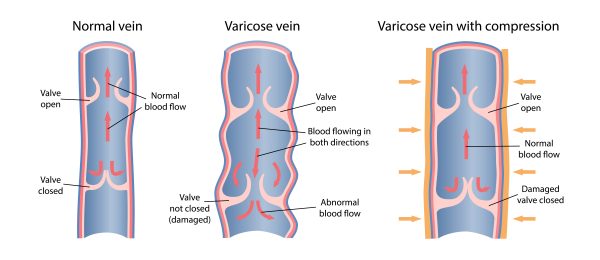At the end of the day, most of us are tired, ready to kick up our feet and relax on the couch. But for many people, it’s not just tiredness from the day. Aching, sore, cramping, and heavy legs can often be a sign of something more than just daily fatigue. At the end of the day, if it feels like you’re dragging around bags of flour instead of legs, there is a chance an underlying medical condition is behind it.
Why do my legs feel heavy?
Varicose Veins
One of the most common causes of heaviness in the legs is varicose veins.
Varicose veins are caused by a wide range of factors.
Veins carry oxygen-rich blood from around the body, back up to the heart. However, when vein valves, or vein walls, become damaged, the process slows. Specifically, blood leaks through the valves instead of flowing to the heart. So, why do the legs feel heavy? When CVI occurs, blood can’t flow back up to the heart. Instead, it begins to reflux or pool, forming twisted, enlarged vessels which often ache, especially after extended periods of walking or standing.
PAD (Peripheral Arterial Disease)
This occurs when fatty deposits build up on the walls of your arteries, restricting the blood flow. This most commonly occurs in the legs and is exacerbated by other factors such as smoking, high blood pressure, diabetes and high cholesterol. It often causes aches and cramping.
Overtraining
This is not a disease or medical condition so much as the result of too much force on the legs. This syndrome is common among athletes, people training for events like marathons or triathlons, and anyone who drastically increases their workout routine. Overtraining means the muscles don’t have time to repair themselves, which leads to fatigue and heaviness.
Learn more about why our muscles get sore: Why are my hamstrings tight?
Restless Leg Syndrome
Restless leg syndrome causes an uncomfortable feeling in the legs. With this condition, you might experience heaviness, numbness and a throbbing shaky feeling whenever the legs are still. Movement relieves the symptoms. But unfortunately, there’s no clear cause.
What to do if my legs feel heavy at the end of the day
Whichever symptoms come along with the feeling of heaviness, it’s best to speak to your GP to get checked and diagnosed. From there you can confirm the best course of treatment. However, there are several things you can do yourself that help to manage heavy legs regardless of the cause.
- Compression stockings: The use of medical-grade compression stockings is one of the most effective ways of treating heavy legs, as it boosts circulation to provide healthy blood-flow, stabilises the muscles for recovery and daily fatigue, and alleviates pain and twitching in the muscles.
- Stretching and exercise: Keeping the legs moving is important for your vein health and general health. If you’re spending long periods of time sitting down for work, either at the desk or in the car, get up and move around a little every 20-30 minutes to keep the blood flowing and muscles moving.
- Lifestyle: Changing your lifestyle to lose any excess weight, reduce cholesterol, fat and sugar in your diet, and quitting smoking are all great changes to make for your legs, and for your health as a whole.
Seek expert advice
The doctors at The Vein Institute specialise in varicose vein treatment. We offer patients a comprehensive program using non-surgical laser treatment techniques.
The benefits of non-surgical varicose vein treatment are:
- Walk-in walk-out treatment
- 98% success rate
- Extremely effective
- Can be performed at a clinic (no hospitalisation)
- No general anaesthetic
- Medicare rebates apply
- No downtime or time away from work
To book a consultation and discuss our treatment program, call 0420 102 637. Or, make an enquiry via the Contact Us page.
See more varicose vein facts: Answering Your Vein FAQs



